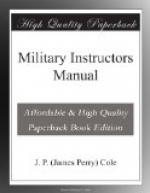(a) As soon as practicable get the company organized into permanent squads. Try out squad leaders for a few days. You will soon be able to select the men that you will want for non-commissioned officers. Be careful in their selection so that you will not have to make many changes. Don’t be in too much of a hurry about making sergeants; try them out as corporals first. Try to get a good man and start him in as mess sergeant. A man with hotel experience, especially the kitchen and dining room end of the business, give him a trial. Your lieutenant in charge of the mess can tell in a day or two how he stacks up. Make it plain that the men detailed from day to day are merely acting non-commissioned officers and that you are merely placing them in charge to give them an opportunity to demonstrate their ability. It’s better to work this proposition out in a systematic manner than it is to jump in and make a lot of non-commissioned officers that you will have to break later on to make way for better men.
Give your acting non-commissioned officers all the responsibility you can. Assign tasks with their squads and see how they get away with it.
(b) At one of the first formations explain the rules of camp sanitation and personal cleanliness and the necessity for their strict observance.
(c) Start right out with a system of rigid inspections so that the men will acquire habits of cleanliness and tidiness of their surroundings. Once this is acquired it is easily maintained. The reverse of this statement is equally true. Let a company get started in a slovenly, untidy manner and it is difficult to get it back on the right track again.
(d) As soon as uniforms are issued have every man dispose of his civilian clothing, dress suit cases, trunks, etc. There is no place for them in the cantonments or tents. Strip right down to uniforms and allow no civilian clothing around.
(e) Before issuing rifles provide places for their safe keeping in cantonments. If wooden trunks are used, a wire staple driven into the upright of the bed at the height of the slacking swivel forms an excellent support; simply hook the slacking swivel into the staple.
(f) Get every man interested in the company. Be personally interested in every man yourself. Do not permit any swearing at the men or around the barracks. Explain the idea of military courtesy and the salute and insist on its being carried out at all times. By doing all of these things and systematizing your work of training and instruction right from the start you lay the foundation for a “good company.” Fifteen good companies make a “good regiment” and so on up to the division, and that’s what we want “good divisions”—the basis of which lies in the “good company” which you are going to command.
DAY’S ROUTINE.—The day’s routine will soon develop and cannot be a stereotyped thing. It will be determined to a large extent by local conditions. But in all training camps some such model as the following will no doubt be followed:




